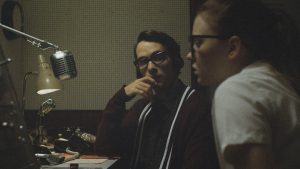In “The Vast Of Night,” it seems like a regular evening in a small 1950s New Mexico town. Almost everyone is at the high school gym for a big basketball game. But Everett (Jake Horowitz) and Fay (Sierra McCormick) have to get to their jobs as a disc jockey on the local radio station and as the town’s switchboard operator, respectively.
The relative calm is interrupted when Fay hears a weird staticky humming on one of her phone lines, then another. She calls Everett at the radio station and he asks her to play it for him. He can’t identify the source, so he puts it on the air to ask his listeners if they know what’s causing it. Pretty soon, a man named Billy calls up and offers an explanation based on something he was involved in when he served in the military. But that doesn’t solve the mystery, which grows to include some other locals as the tension rises.
The best part of “The Vast Of Night” is the way rookie director Andrew Patterson keeps the camera on each of his protagonists for long shots, so while we can hear Fay and the others on the line, we only see her as she reacts. The same is true of Everett while he’s listening to the unseen Billy. Patterson even allows the screen to go completely dark for a few seconds, forcing us to concentrate on the audio, not the visual. But when the action moves out of the claustrophobic spaces Everett and Fay work in, the camera moves swiftly through the mostly-empty town as the tempo of the story increases.
Unfortunately, most of the movie is poorly lit. I know it all takes place at night, but even the indoor scenes could have used a few more fill lights.
Writers James Montague and Craig W. Sanger have composed a tight, minimalist script, but except for the center section where the mystery begins, they tried to do a little too much. There’s a framing device that makes it seem as if the whole story takes place within a black and white “Twilight Zone”-type show called “Paradox Theater.” The opening minutes of the movie are layered with so much overlapping dialogue it would have given Robert Altman a headache — we had to put on the subtitles to understand what everyone was saying. The screenplay includes some Cold War paranoia that doesn’t work because it’s so obvious the plot isn’t headed in that direction — and the movie’s climax would have worked better if it hadn’t relied on Spielberg-like special effects, but had kept us wondering what really happened.
I have to throw in two of my Broadcaster’s Pet Peeves: 1) The call letters of the radio station Everett works for, WOTW, may be a tip of the hat to “War Of The Worlds,” but are problematic because every broadcast facility in New Mexico has call letters that start with K, not W; and 2) No on-air personality, even in a tiny town, would ever abandon the radio station to go investigate anything, as Everett does in the last third of “The Vast Of Night.”
That said, McCormick and Horowitz are both very good and share real platonic chemistry. I especially enjoyed McCormick’s reaction as Fay hears her own voice played back from a reel-to-reel tape recorder for the first time.
“The Vast Of Night” is the kind of movie that would never have succeeded in movie theaters because it’s so small, but it does work as streaming content on Amazon Prime. I look forward to seeing what its heretofore unknown stars, director, and writers work on next.
I give “The Vast Of Night” a 6 on a scale of 10.

